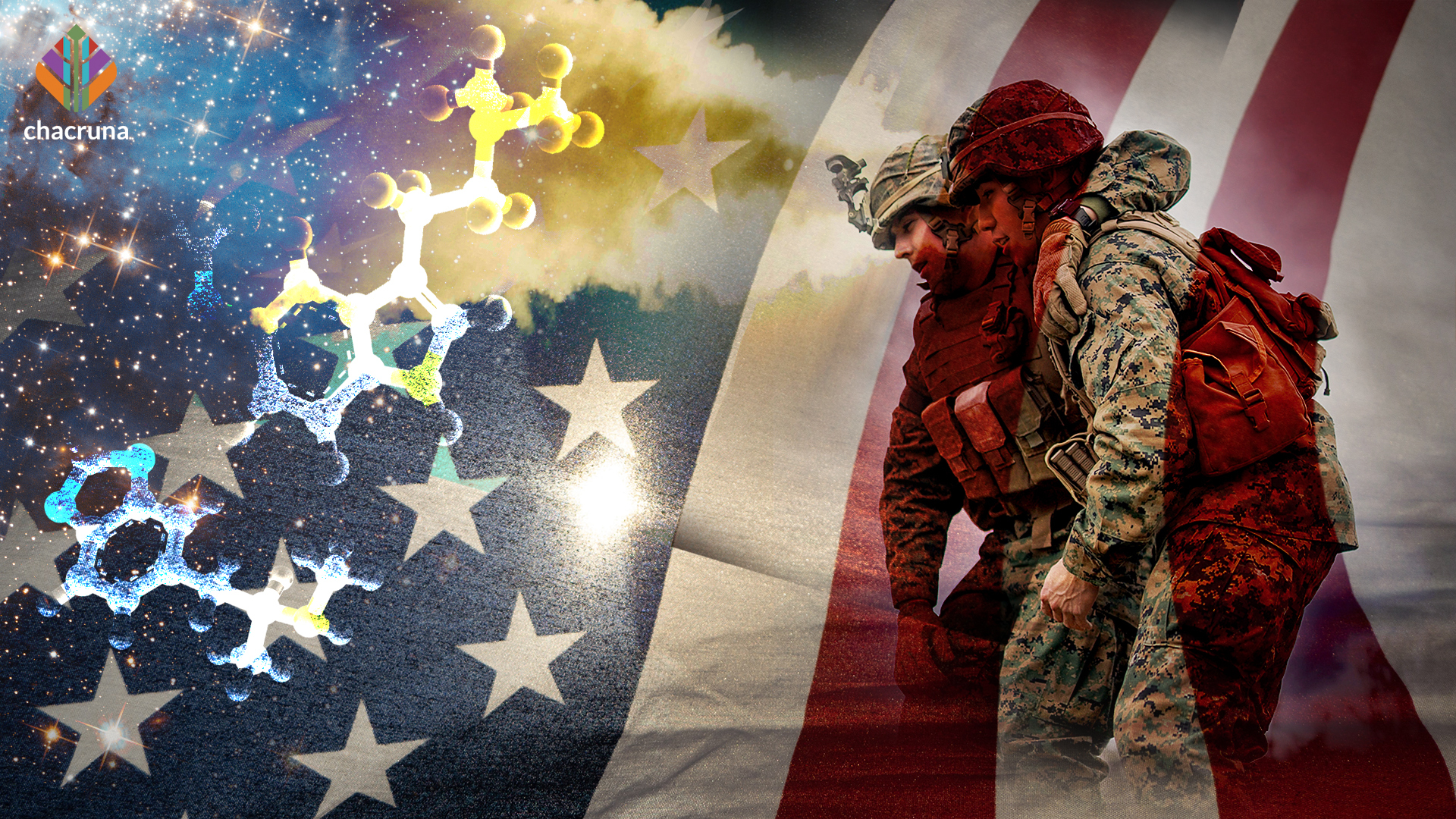July 19, 2022
The Veteran Mental Health Leadership Coalition (VMHLC), including the undersigned organizations and advisors, is proud to support the Right to Try Clarification Act introduced by Senators Rand Paul and Cory Booker.
My name is Martin R. Steele, and I am a retired Lieutenant General in the United States Marine Corps., a Vietnam-era combat Veteran, and Chief Executive Officer of Reason for Hope. I served on the Commission on Care during the Obama Administration (nominated by Senator Mitch McConnell), was twice nominated by President Trump to serve as the Secretary of Veterans Affairs, and I am now leading the VMHLC in what I consider to be the most significant mental health policy and advocacy initiative of my lifetime. The Right to Try Clarification Act is the first in a series of forthcoming bills that VMHLC plans to lead as part of our fight to prevent suicide and deaths of despair – not only for Veterans – but for all Americans – through increased access to safe and affordable psychedelic-assisted therapy. While the Right to Try Clarification Act is the narrowest in scope of our planned forthcoming legislation, it is also the most urgent, as it seeks to open access to MDMA- and psilocybin-assisted therapy for a small subset of Veterans who are at serious risk of suicide and have exhausted all other options.
Join Chacruna’s course Diversity, Culture and Social Justice in Psychedelics
Veterans who exhausted all options are precisely those that our coalition represents: specifically, the thousands of Veterans who nearly lost all hope after struggling through (sometimes double digit) ineffective medications and therapies – which often left them worse off than where they started – before eventually leaving the country they served in a last-ditch effort to receive psychedelic-assisted therapy in Mexico, Costa Rica, Jamaica, and other countries where they could legally access this life-saving treatment. Indeed, our coalition members Veterans Exploring Treatment Solutions (VETS), Heroic Hearts Project, SEAL Future Foundation, the Hope Project, Sabot Foundation, and Veterans of War, together have funded around 1,065 Veterans to receive psychedelic-assisted therapy outside our nation’s border, with over 600 of those Veterans treated at The Mission Within, a clinic on the outskirts of Tijuana, Mexico. The number is much larger when considering those who were fortunate enough to be able to self-finance travel and treatment outside the country. And for most of these Veterans, psychedelic-assisted therapy has proved not only lifesaving, but life-restoring.i
However, we find it morally unacceptable that our nation’s Veterans should be forced to take such extreme, and often detrimentally expensive routes to potentially lifesaving interventions. Recently, I testified before the state of Connecticut Public Health Committee that “we have a duty, responsibility, and more than ever, an urgency, to help . . . all those suffering from trauma – to heal and move forward as productive members of society. Unfortunately . . . we have failed to do so for far too long.”ii The Right to Try Clarification Act is a small step in the right direction toward saving lives, which we urge lawmakers on both sides of the aisle to strongly support. There is simply no reasonable justification for the status quo when MDMA and psilocybin-assisted therapies both have been granted a Breakthrough Therapy designation by the FDA, which is a: “process designed to expedite the development and review of drugs that are intended to treat a serious condition and preliminary clinical evidence indicates that the drug may demonstrate substantial improvement over available therapy on a clinically significant endpoint(s).”iii
We also note that our support for this bill is not an attempt to merely circumvent the regulatory infrastructure needed to provide these therapies safely and affordably on a larger scale, with treatment covered by insurance. Indeed, we have been leading an ambitious initiative to streamline the regulatory infrastructure for MDMA- and psilocybin-assisted therapy through advocating for the establishment of an interagency task force within the Department of Health and Human Services, which is meant to issue guidelines that assist states in addressing the complex clinical, regulatory, and public policy issues necessary for the ‘real-world’ deployment of these treatments.iv Along the way, we received letters of support sent to Secretary Becerra from a bipartisan group of federal and state legislators, including Congresswoman Madeleine Dean and Congressmen Brian Fitzpatrick, Dean Phillips, Mike Waltz, and Earl Blumenauer, along with the Chair of the New York Assembly Health Committee, Richard Gottfried, and state bill sponsors from New York, Pennsylvania, Texas, and Connecticut. We also successfully led the passage of legislation in Connecticut establishing an innovative, first in the nation, expanded access pilot program for these therapies, which includes funding for the treatment of Veterans, first responders, and front-line health care workers and which will explore different therapeutic protocols and provide real-world data to inform the Federal Task Force in establishing best practices and standards of care.
We are proud to share that the Substance Abuse and Mental Health Service Administration, on behalf of Secretary Becerra, recently responded in agreement with these letters and indicated plans to move forward with the suggested Federal Task Force.v However, these regulatory initiatives will take time to develop (in parallel with final FDA approval of MDMA and psilocybin); time that some Veterans unfortunately do not have the luxury of waiting on, as Veteran suicides are still (likely conservatively) estimated between 17-22 per day and nationwide deaths of despair continue to rise despite increased spending on mental health care. vi
We know that America can do better and the Right to Try Clarification Act is a small step in the right direction. We hope to see widespread bipartisan support for this potentially life-saving legislation.
Sincerely,

Veteran Mental Health Leadership Coalition Members
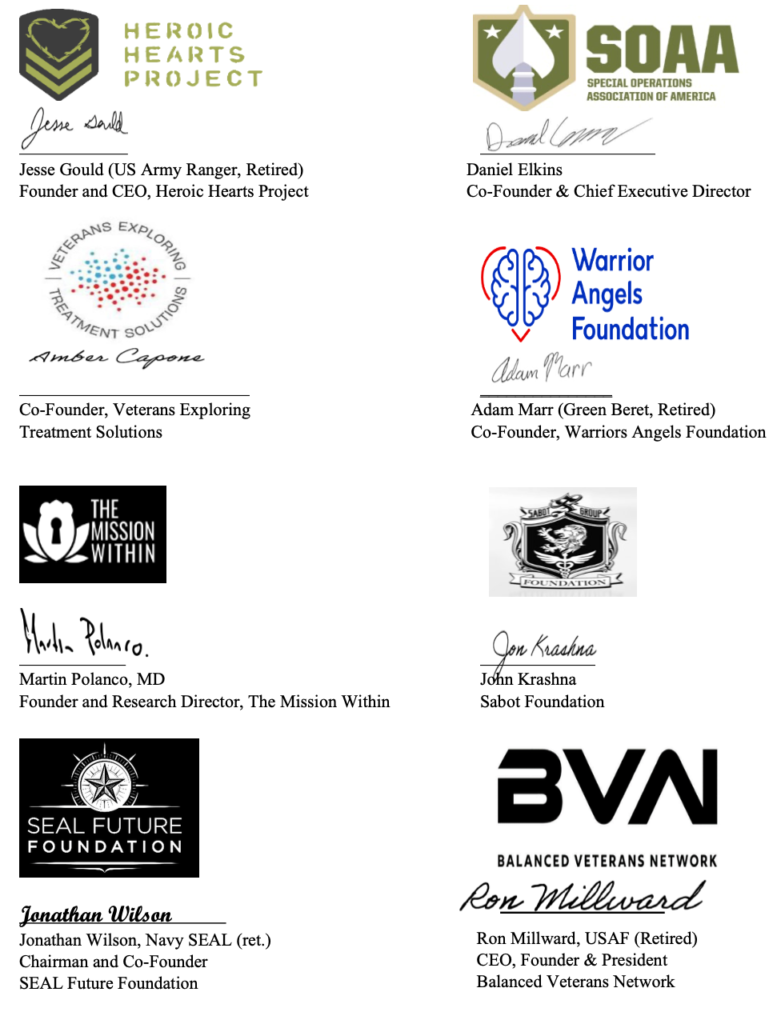
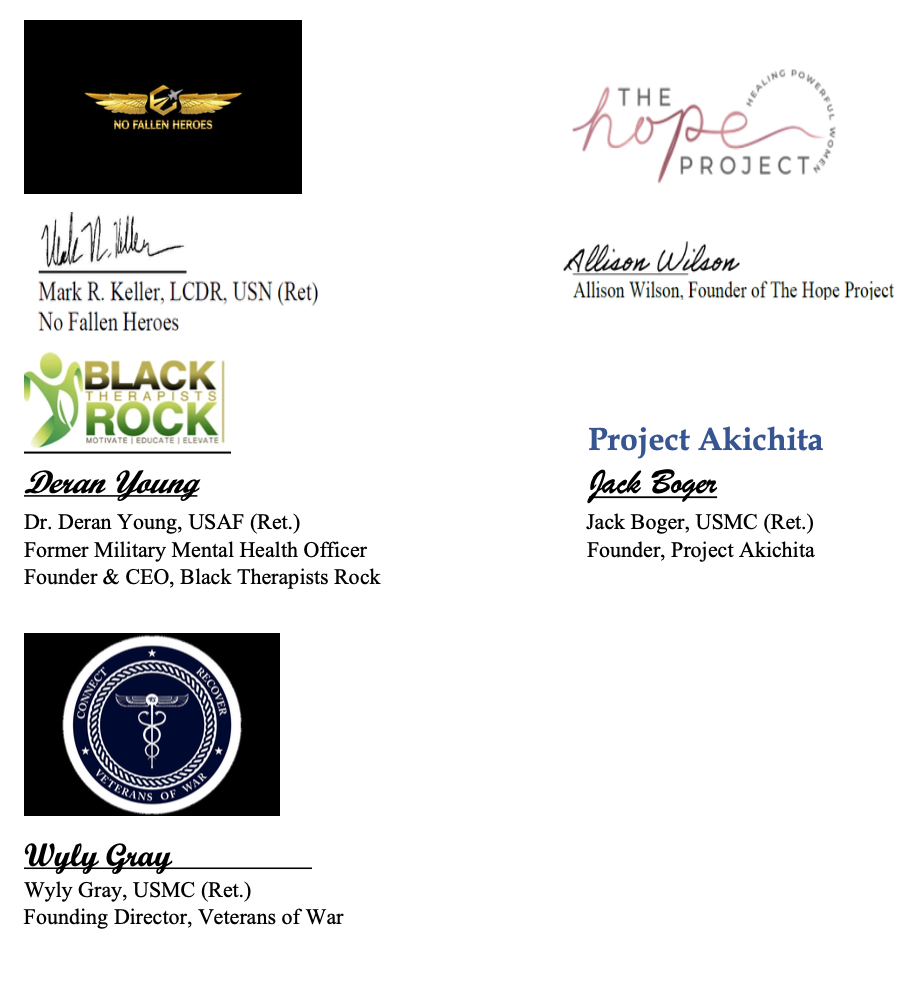
Veteran Mental Health Leadership Coalition Advisory Board
Lynnette Averill, PhD
Chief Science Officer, Reason for Hope
Associate Professor & Clinical Research Psychologist, Baylor College of Medicine Adjunct Assistant Professor, Yale School of Medicine
Julie Holland, MD
Psychiatrist, NYC Private Practice
Author of national bestselling “Weekends at Bellevue: Nine Years on the Night Shift at the Psych ER” Former Assistant Clinical Professor of Psychiatry, New York University School of Medicine
Walter Dunn, MD, PhD
Health Sciences Assistant Clinical Professor, Dept of Psychiatry, UCLA
Associate Medical Director for the UCLA Operation Mend PTSD Treatment Program
Hannah McLane, MD, MA, MPH
Founder and Director, SoundMind Institute
Denise F. Bottiglieri, PhD
Board Member SEAL Future Foundation Leadership Counsel Bob Woodruff Foundation
Martin R. Steele, Lieutenant General, US Marine Corps (Retired)
Chief Executive Officer, Reason for Hope
U.S. Global Leadership Coalition, National Security Advisory Council
Cynthia Levy, MALD, MPA, PhD
Operations Coordinator, Reason for Hope
Former Assistant to the Secretary of Defense and Assistant Provost of the Naval Postgraduate School Retired Professor of Strategic Studies and National Defense
Jesse MacLachlan
State Policy and Advocacy Coordinator, Reason for Hope Former 3 term Connecticut State Legislator
Brett Waters, Esq.
Executive Director, Reason for Hope Associate Attorney, Winston & Strawn, LLP
Michael Cotton
Former Owner/COO, Meridian Health
Mike Botelho, U.S. Army Ranger/Judge Advocate, MAJ (R)
Former Deputy Staff Judge Advocate, U.S. Army Criminal Investigation Command Former Chief of Intelligence Law, NATO and Resolute Support, Kabul, Afghanistan
RADM Brian Losey, USN (Ret.)
Executive Director, CVB Veterans Advisory Council
Mark Leavitt
Rear Admiral, US Navy (Ret.)
Scott J. Vail
Associate Attorney, Ropes & Gray LLP
Lucas Brown
Associate Attorney, Ropes & Gray LLP
——-
See, e.g., A Balm for Psyches Scarred by War, The New York Times, available at
i
https://www.nytimes.com/2022/05/29/health/mdma-therapy-ptsd.html; supra, n. iv.
ii Connecticut General Assembly, Public Health Committee Testimony re: AN ACT INCREASING ACCESS TO MENTAL HEALTH MEDICATION (HB 5396), available at, https://www.cga.ct.gov/asp/menu/CommDocTmyBillAllComm.asp?bill=HB-05396&doc_year=2022.
iii See https://www.fda.gov/patients/fast-track-breakthrough-therapy-accelerated-approval-priority- review/breakthrough-therapy.
iv See Exhibits 1 and 2. For an example of these complexities, while FDA approval of MDMA and psilocybin will likely be tied to a Risk Evaluation Mitigation Strategy (REMS) that determines the parameters of safe use, these medicines, and particularly psilocybin, can be broadly acquired from other non-FDA approved sources, such as natural psilocybin-producing mushrooms, which will not be subject to those same REMS protocols. Further, unlike marijuana, psychedelic treatments require the regulation of both a drug and a therapy, the latter of which is traditionally a matter of state authority. See id.
v See Exhibit 3.
vi From 2010-2019, annual deaths of despair (including suicide, alcohol, and opioid-related deaths) rose sharply from around 94,000-to-150,000 per year (a 50% increase), despite consistent annual spending increases from federal and state governments that totaled around $1 trillion during this same period. See Substance Abuse and Mental Health Services Administration, Projections of National Expenditures for Treatment of Mental and Substance Use Disorders, 2010–2020, HHS Publication No. SMA-14-4883, Rockville, MD: Substance Abuse and Mental Health Services Administration, 2014, Table A.6; SAMHSA Spending Estimates – Projections for 2010-2020; Dieleman JL, Baral R, Birger M, et al. US Spending on Personal Health Care and Public Health, 1996-2013. JAMA. 2016;316(24):2627– 2646. doi:10.1001/jama.2016.16885; Dieleman JL, Cao J, Chapin A, et al. US Health Care Spending by Payer and Health Condition, 1996-2016. JAMA. 2020;323(9):863–884. doi:10.1001/jama.2020.0734.]].
Exhibit 1
February 11, 2022
The Honorable Xavier Becerra
Secretary of Health and Human Services US Department of Health and Human Services 200 Independence Ave., SW
Washington, DC 20201
Re: Establishing an Inter-agency Taskforce on Psychedelic Medicines and Therapies
Dear Secretary Becerra:
Thank you for your hard work on behalf of the American people and your dedication to solving the many healthcare issues our nation faces as we continue to battle the COVID-19 pandemic.
It has come to our attention that the Food and Drug Administration (FDA) is likely to approve MDMA for the treatment of Post-Traumatic Stress Disorder (PTSD) and psilocybin for the treatment of depression within approximately 24 months. Moreover, as National Institute on Drug Abuse (NIDA) Director Nora Volkow noted during a recent psychedelic workshop, “the train has left the station” regarding therapeutic use of psychedelics, and people are going to use them regardless of whether regulators act1.
To that end, we are requesting your consideration in establishing an inter-agency taskforce on the proper use and deployment of psychedelic medicine and therapy – and that the taskforce be situated in the Office of the Assistant Secretary of Health.
Given the mental health and substance abuse crises exacerbated by the ongoing COVID-19 pandemic, we believe it is critical to ensure our nation’s healthcare system has all tools at its disposal to combat these crises effectively. It is apparent that psychedelic medicines represent not just a new wave of psychiatry, but a significant shift in the delivery of mental health care, which does not neatly fit within our current system. The time intensive treatment process, including preparation, an administration session lasting several hours, and integration therapy (generally referred to as “psychedelic-assisted therapy”), will require an interdisciplinary approach with specialized training for session facilitators, and vastly different cost, insurance coverage, and infrastructure considerations.
With millions of Americans suffering from depression, PTSD, and suicidality, we believe we must take proactive measures to ensure we are prepared to safely and responsibly roll out new these new treatments when they become available. Thus, we are very encouraged to learn that Biden
1 https://darik.news/southdakota/top-federal-drug-official-says-train-has-left-station-on-psychedelics-as-reform- movement-spreads/202201474253.html
Administration officials are considering authorization of an inter-agency strategic task force to address the complex clinical, regulatory, and public policy issues necessary for the ‘real- world’ deployment of psychedelic medicine and therapy. We suggest the federal task force be situated in the Office of the Assistant Secretary of Health, where it can ideally leverage the convening authority of the Office of Management and Budget, and ensure all relevant federal agencies work in partnership with public and private sector stakeholders, including state agencies, to draft necessary regulations and guidelines. This prudent measure will help to ensure our nation has a framework for the responsible, accountable, safe, and ethical deployment of psychedelic therapies for mental health disorders when the FDA approves their use.
Nevertheless, while FDA approval will likely be tied to a Risk Evaluation Mitigation Strategy (REMS) that determines the parameters of safe use, we know that psychedelic medicines, and particularly psilocybin, can and will be broadly acquired from other non-FDA approved sources – whether before or after the particular substance is rescheduled – which will not be subject to those same REMS protocols. This will be particularly true should FDA-approved therapies prove unaffordable or inaccessible to large segments of the population, which will rapidly fuel underground use or the establishment of a patchwork system of state decriminalization and/or legalization efforts. Indeed, psilocybin and other psychedelic compounds can be cultivated at home relatively easily, and several states have already passed or proposed measures for decriminalization or the creation of intrastate regulatory systems authorizing cultivation, production, distribution, research, and supervised or therapeutic use of non-FDA approved formulations of psilocybin or psilocybin mushrooms.
Further, unlike the already complex state regulatory patchwork created by marijuana, psychedelic treatments require the regulation of both a drug and a therapy, the latter of which is traditionally a matter of state authority. For example, Oregon is already determining the necessary qualifications to facilitate supervised adult use of psilocybin through a collaborative process between the Oregon Health Authority and an Advisory Board of stakeholders; while states such as New York have introduced legislation that would require medical scope of practice considerations and qualifications for psilocybin-assisted therapy (involving psilocybin produced within the state).
Thus, we find it clear that REMS protocols alone are insufficient to ensure any broad-based harm reduction efforts, including safe supply, safe and ethical use, and accountability of session facilitators for psychedelic therapies, which would be more appropriately addressed through the proposed task force and public-private partnership with stakeholders. Establishing national guidelines through this collaborative process, to be published in the federal register, would significantly ease the burden on individual states attempting to address the myriad of complex issues. Moreover, published national guidelines would be the most effective mechanism in establishing good standards of practice, including provider training, credentialing, state licensure, dispensing, safe and ethical use monitoring, etc. States will be able to then reference these national guidelines when implementing their own frameworks that meet their needs and requirements, with support and federal funding through SAMHSA block grants. Vitally, national guidelines will further facilitate the necessary scale up for a workforce of trained, credentialed, licensed, and
accountable psychedelic-assisted therapy session facilitators, while ensuring the critical safety and ethical monitoring and reporting systems that protect the broader public.

Discover the Indigenous Reciprocity Initiative of the Americas
We would be happy to work with you implementing this task force to ensure that the Department of Health and Human Services continues to be at the center of our nation’s healthcare regulatory framework, and that all necessary departments and agencies work collaboratively. If you have any questions, please reach out to Chris McCann in Congresswoman Dean’s office: [email protected], and we appreciate your vision and leadership on this issue. Thank you for your full and fair consideration of this matter, consistent with applicable agency guidelines.
Sincerely,
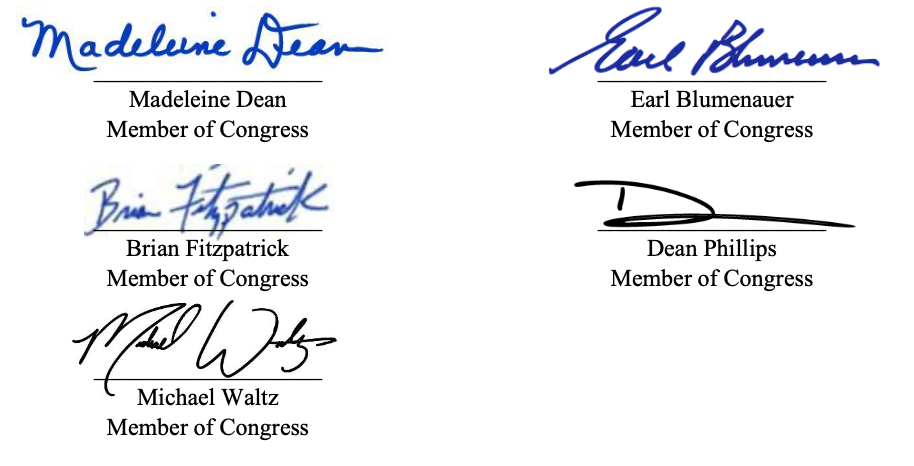
Exhibit 2
VMHLC
February 11, 2022
The Honorable Xavier Becerra
Secretary of Health and Human Services
US Department of Health and Human Services 200 Independence Ave., SW
Washington, DC 20201
Re: Establishing an Inter-agency Taskforce on Psychedelic Medicines and Therapies Dear Secretary Becerra:
Thank you for your persistence in addressing the many health care issues challenging our nation as we continue to battle the COVID-19 pandemic.
We have been informed by Reason for Hope, a non-profit policy and advocacy organization, that in advance of anticipated Food and Drug Administration (FDA) approval of MDMA for the treatment of Post-Traumatic Stress Disorder (PTSD) and psilocybin for the treatment of depression (expected within approximately 24 months), the Biden Administration is considering authorization of an inter-agency strategic task force to prepare for the real-world deployment of psychedelic medicine and therapy. We understand that the strategic task force would lead a public-private partnership with various groups of stakeholders, including relevant state agencies, to address the myriad complex regulatory and public policy issues necessary to ensure a framework for the safe and responsible use of psychedelic therapies for mental health care.
Whether through the FDA or state law, it seems clear that legalizing psychedelic medicine is far more complex than a typical drug approval; rather, it represents perhaps the most significant shift in the delivery of mental health care in modern history. The time intensive treatment process, generally including preparation, administration, and integration sessions (“psychedelic-assisted therapy”), does not fit neatly within our current mental health care system. Indeed, we must carefully consider issues of cost, access, infrastructure, and insurance coverage within this new paradigm of care.
We thus fully support the Biden Administration taking an active role in helping states to navigate this landscape. Reason for Hope, who helped prepare the October briefing for HHS and SAMHSA leadership, explained that the intended result of the inter-agency strategic task force would be to publish national guidelines in the federal register pertaining to issues such as provider training, credentialing, state licensure, dispensing, monitoring, instituting good standards of safe and ethical practice, etc. We are encouraged to learn that states would then receive block grant funding and support from SAHMSA to implement or tailor the guidelines to meet their individual needs.
After reviewing the October briefing materials, we are confident that the task force will significantly ease the burden on each state to develop its own novel regulatory system, and enable a scaled-up force of trained, credentialed, licensed, and accountable psychedelic-assisted therapy session facilitators. Critically, this will also help ensure a cohesive system for safety and ethical monitoring and reporting nationwide. However, while we view this collaborative process as a clearly beneficial starting point, we believe that each state must also retain flexibility to adapt its regulations to meet the needs of its citizens as we learn new information in this emerging space.
Finally, given the ongoing mental health and substance abuse crises exacerbated by COVID, several states have already passed or proposed intrastate regulatory systems for research and supervised use of psilocybin, opting not to wait for FDA approval. Indeed, as NIDA Director Nora Volkow recently stated, “the train has left the station” regarding use of psychedelics as a mental health treatment.1 And we need not look far to see that without proactive federal leadership and guidance, the result will be a confusing and administratively burdensome patchwork of state laws. However, this state patchwork will prove far more complex than with marijuana, as psychedelic-assisted therapy involves regulation of both a drug and the practice of medicine, which is traditionally a matter of state authority.
Thus, we reiterate the urgency to authorize the psychedelic task force and begin the process of federal and state government officials and stakeholders working together to create a cohesive regulatory system, through which states retain control over the practice of medicine.
Please reach out to Brett Waters, Co-Founder and Executive Director of Reason for Hope, or Kayleigh Zaloga, Legislative Assistant to New York State Assemblyman Richard Gottfried, if you have any questions that you would like to discuss: [email protected]; [email protected]. We appreciate your vision and leadership on this issue.
Sincerely,

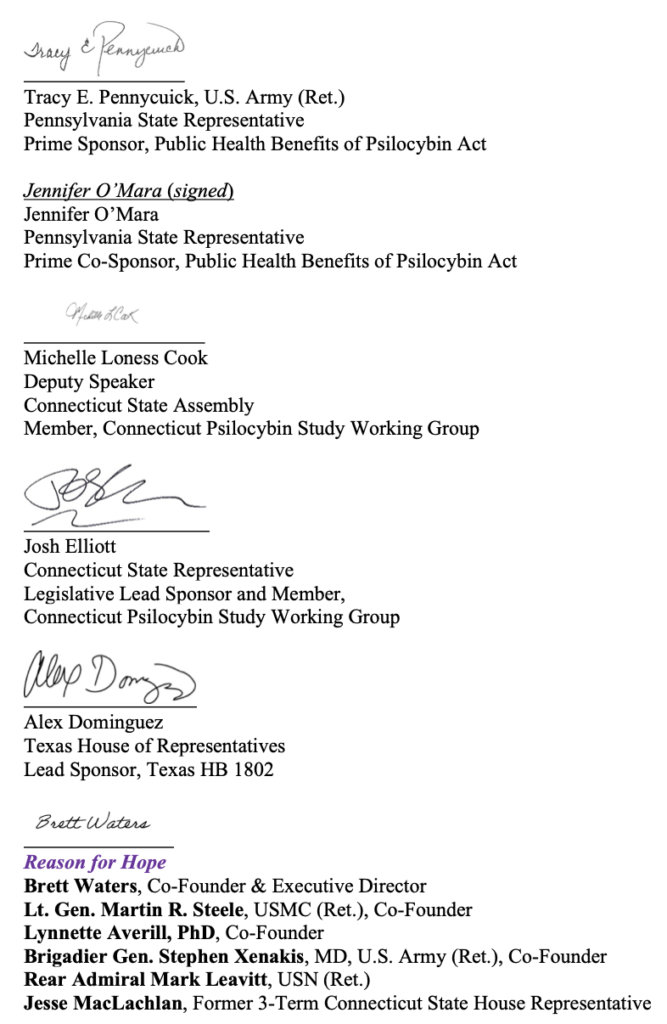
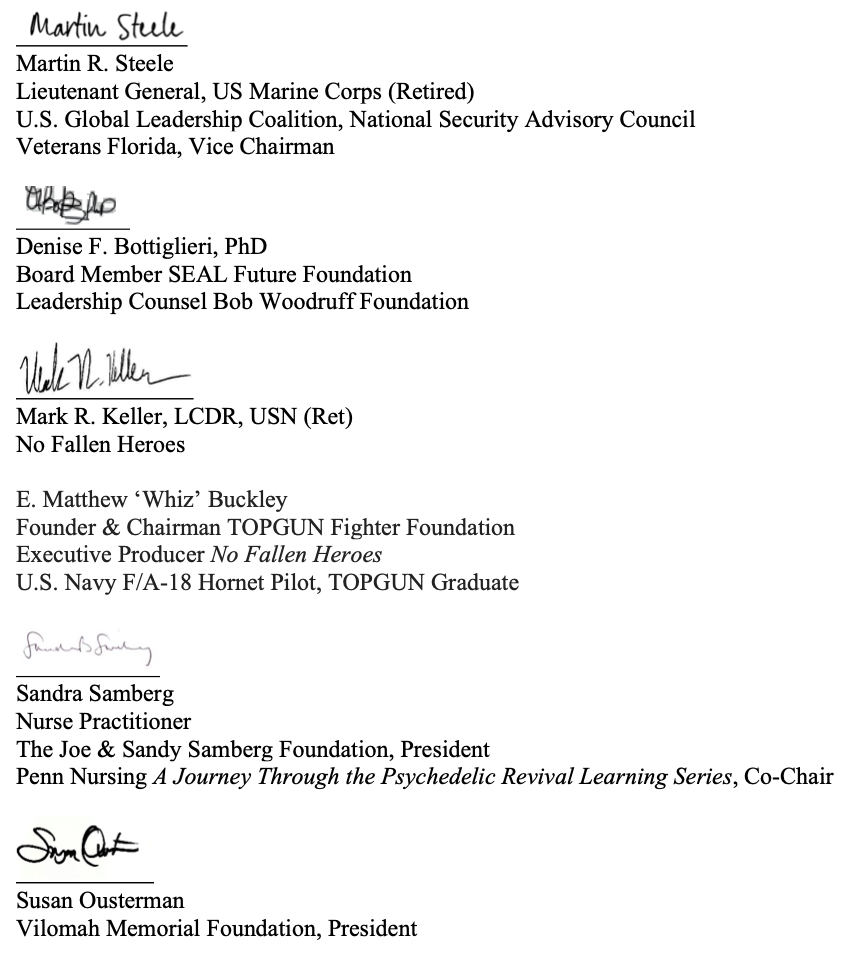
Exhibit 3
May 13, 2022
The Honorable Madeleine Dean U.S. House of Representatives Washington, DC 20515
Dear Representative Dean:
Thank you for your letter to Secretary Becerra in which you recommend the establishment of an interagency Federal Task Force to develop and lead a public-private partnership that can address the myriad of complex issues associated with the anticipated approval by the Food and Drug Administration (FDA) of 3,4-methylenedioxymethamphetamine (MDMA) for the treatment of Post-Traumatic Stress Disorder and psilocybin for the treatment of depression within approximately 24 months. The Substance Abuse and Mental Health Services Administration (SAMHSA) was asked to respond on the Secretary’s behalf.
SAMHSA agrees that too many Americans are suffering from mental health and substance use issues, which have been exacerbated by the ongoing COVID-19 pandemic, and that we must explore the potential of psychedelic-assisted therapies to address this crisis. SAMHSA also agrees that the use of psychedelic medicines will require a broad-spectrum interdisciplinary stakeholder approach to effectively tackle the complexity of issues that stakeholders anticipate will arise with their introduction.
SAMHSA, in collaboration with the Assistant Secretary for Health, is exploring the prospect of establishing a Federal Task Force to monitor and address the numerous complex issues associated with emerging substances. The Task Force may establish and oversee the functions of a public-private partnership that can broadly focus on addressing numerous complex issues associated with psychedelic (psilocybin) and entactogenic (MDMA) medicines but whose risks to public health may require harm reduction, risk mitigation, and safety monitoring. Collaboration across federal agencies with outside stakeholders will be the most effective way to ensure we are thoughtfully coordinating work on emerging substances such as MDMA and psilocybin.
Thank you for taking the time to elevate this important issue.
Sincerely,

Art by Trey Brasher.
Take a minute to browse our stock:
Did you enjoy reading this article?
Please support Chacruna's work by donating to us. We are an independent organization and we offer free education and advocacy for psychedelic plant medicines. We are a team of dedicated volunteers!
Can you help Chacruna advance cultural understanding around these substances?










